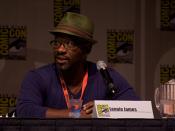Everyone has a dream, whether it be earning a degree at some prestigious university, or having a stable job in order to own a house and support a family. In John Steinbeck's novel, Of Mice and Men, he exhibits the fact that no matter how extreme or reasonable one's dream is, every person has the right and ability to ponder how their life could be. However, many people fail to achieve their dreams. Some dreams are lost in the battle with society, but most of the time the person's internal limitations are the central cause of the dream's downfall. Steinbeck uses the major characters of his novel to express the idea behind dreams.
Steinbeck uses the characters of George Milton and Lennie Small to thoroughly explore his idea about dreams. George an Lennie are ranchhands who believe that they "don't belong no place". They are both considered to linger among the lowest rung of the social ladder.
Society has driven these two men to believing in the idea that they "ain't got nothing to look ahead to." Even though George and Lennie have a dream about owning "a little house and a couple of acres an' a cow and some pigs and rabbits"someday, their own individual faults hinder their dream from ever coming true. George's fatal flaw is that he puts to much trust in Lennie. Lennie is mentally handicapped, and everyone refers to him as "a cuckoo". George becomes too reliant in Lennie, and Lennieends up breaking Curley's wife's neck, and killing her. With the death of Curley's wife, George and Lennie's dream also die. George replies to Candy when he asks if they can still "get that little place", "--I think I knowed from the very first. I think I knowed we'd never do her." When Lennie commits his act of nonintentional murder, George realizes that he must kill Lennie. Lennie's dream actually never dies in his mind because George kills him with his dream intact. All Lennie wants to do is "live of the fatta the lan'", and "tend the rabbits". The man whom society sees as a "looloo" dies believing he will be able to accomplish his dream someday. Steinbeck uses Lennie and George to show that no matter how low society considers a person to be, they still have the inalienable right to pursue their individual dreams.
Curley's wife is another example that helps bring out Steinbeck's concept of dreams. She is referred to as being a "lousy tart", "jail bait", and a "tramp." Even though her struggle with society is shown through the men's description of her, she still believes that she "coulda made somethin' of herself". She says that she "coulda been in the movies, an' had nice clothes, and had pitchers took of her". It was her dream to be a star because "she was a natural". Her dream never comes true because, as a woman, during the depression, she has no choice but to marry someone who can support her. Her dream dies when she doesn't receive the letters from the man who was going to get her into show business and she replies, "So I married Curley." Being so naive, Curley's wifereally believed that her mother was stealing the letters the man wrote to her. Because of her gullible nature, Curley's wife gives up her dream and marries a man she "don like". Her marriage to Curley brings about her loneliness. She tells Lennie, "I get so lonely. You can talk to people, but I can't talk to nobody but Curley. Else he gets mad. How'd you like to not talk to nobody?" Curley's wife died because she wanted to be popular and her dream, ironically, caused her death.
Crooks is another major character that contributes to John Steinbeck's conception of dreams. The social power group oppresses Crooks because he is black. Anytime the boss gets upset he takes it out on Crooks. Candy explains, "The boss gives him hell when he's mad." Crooks knows that he is not important in society because he is black. "This is just a nigger talking', an a busted-back nigger. So it don't mean nothing, see?" Crooks joins in on George and Lennie's dream of getting a place of their own, "If you .....guys would want a hand to work for nothing--just his keep, why I'd come an' lend a hand." Crooks only wants to belong somewhere and to not be treated so bad. He dreams of being wanted, but thinking that his dream could never really happen brings about his dream's destruction. Crooks comments, "Well jus' forget it, I didn' mean it. Jus' foolin'. I wouldn't want to go to no place like that." He doesn't really believe he could ever really accomplish his dream. Crooks's lack of confidence, which is inspired by society's viewof black people, eventually destroys his hope of ever accomplishing his dream.
In his novel, Of Mice and Men, John Steinbeck illustrates that all humans havethe potential to do well and dream. However, people's dreams are not always fulfilled because they allow personal restrictions and faults to take domination. As Cliff Clavin from Cheers said, "Having a dream isn't stupid, Norm. It's not having a dream that's stupid." It's funny how right he is. Anyone and everyone should have some kind of dream to hold, even if it may not come true.





